In Vietnam’s COVID epicentre, ‘everyone is struggling to survive’
Overwhelmed hospitals and food shortages in Ho Chi Minh City as authorities extend total lockdown.
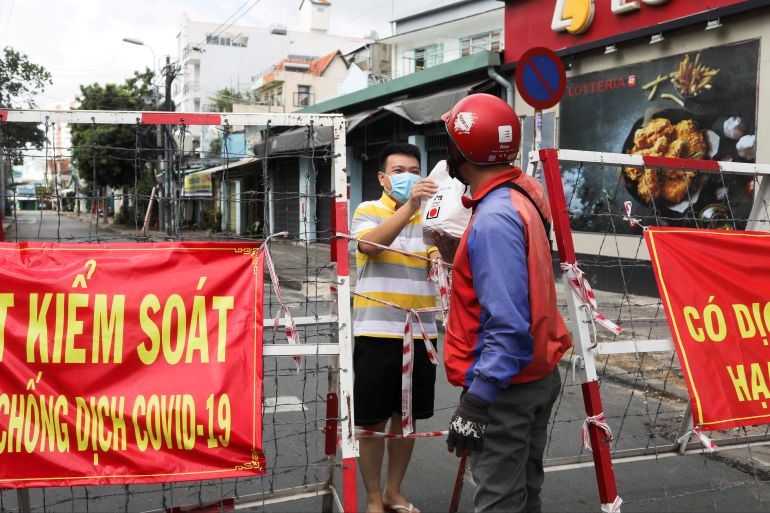
Ho Chi Minh City, Vietnam – Each phone call from Vietnam causes Thai Duong’s heart to skip a few beats.
For Duong, who grew up in District 4 of Ho Chi Minh City but currently lives in California, every contact with home poses the possibility of bad news. He has lost four family members to COVID-19 since Vietnam’s fourth wave turned the country’s containment of the virus from a success story to a nightmare.
Keep reading
list of 4 itemsKabul evacuations ‘sequel to humiliating fall of Saigon in 1975’
Vietnam locks down capital Hanoi as COVID-19 infections soar
Vietnam war journalists’ hub: Caravelle Saigon
No location has been worse hit than Ho Chi Minh City, Vietnam’s biggest city, where Duong’s uncle died of COVID-19 on September 3 after he was placed in the hospital’s tiered system at the level for those in the most critical condition.
“The death rate at that level is 94 percent,” Duong told Al Jazeera.
“Everyone is struggling to survive. If they don’t have COVID already, they struggle to have food.”
Driven by the highly transmissible Delta variant, Vietnam’s fourth wave began on April 27. At the time, only 35 people had died of COVID-19 while the total number of infections stood just under 4,000. Today, there are more than 13,000 deaths, while case numbers top 520,000.
About 80 percent of fatalities and half the infections have occurred in Ho Chi Minh City.
Home to nine million people, Ho Chi Minh City has been under a total lockdown since August 23, with residents forbidden from leaving their homes even to shop for food. With the restrictions set to last until September 15, newly elected Prime Minister Pham Minh Chinh has ordered mass testing for the city’s residents and deployed soldiers to enforce the stay at home orders and help with the delivery of food.
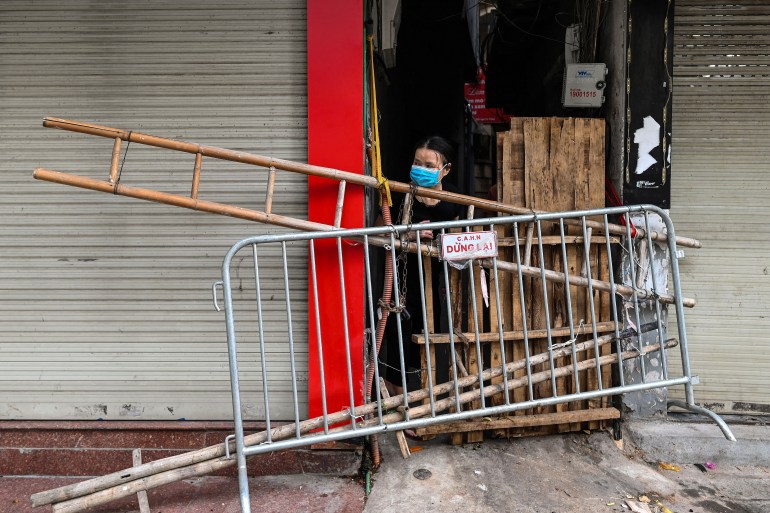
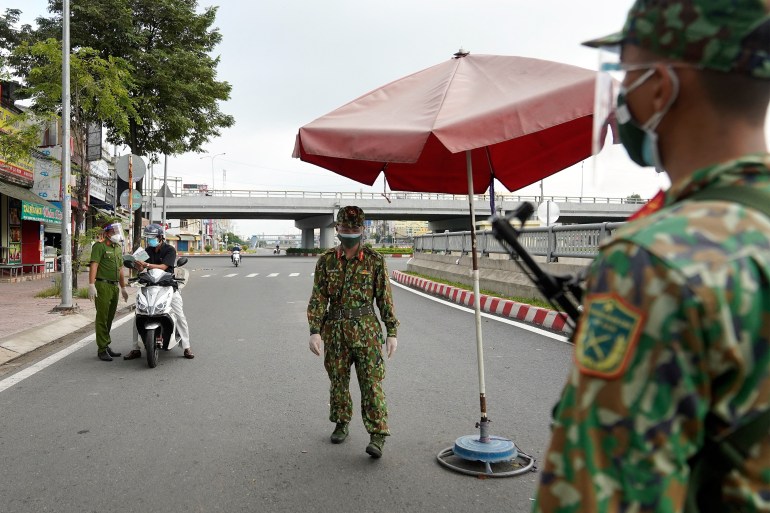
Ho Chi Minh City’s once-bustling streets are now dotted with security checkpoints, some manned by soldiers armed with rifles.
“It is like martial law,” said a political analyst who did not want her name used. “Military people with guns like that is quite unprecedented.”
‘Depressing, heartbreaking’
But despite the strict measures, the number of infections continue to rise in Ho Chi Minh City and more than 200 people are dying every day. On Monday, the city reported more than 7,000 new cases and 233 deaths, rising from a caseload of 5,889 a week ago.
The surge has overwhelmed hospitals. Doctors and nurses from other parts of the country have rushed to Ho Chi Minh City to help treat infected people while the government has offered to pay recovered patients to stay at the hospital to help exhausted medical staff. Meanwhile, despite multiple field hospitals operating in the city, many COVID-19 patients have been forced to recuperate at home.
“It’s depressing. It’s heartbreaking,” said Trang, a 21-year-old medical volunteer who only gave her first name. “One doctor now has to treat maybe 200 to 1,000 patients.”
“Some people blame the government; some people blame the medical system, but nobody wants this.”
One doctor said he was in a state of “insomnia” after working 24-hour shifts.
“It is truly terrible,” said the doctor, who wished to remain anonymous. “Vietnam is not very well-prepared for this pandemic episode.”
With the breakdown of the medical system, the charity group Giang Kim Cuc va cac Cong Su has stepped in to help – delivering oxygen tanks to those with severe symptoms and collecting the bodies of those who have died at home. A video posted by the group last week showed volunteers in full protective gear carrying a body wrapped in plastic into the back of a van as grief-stricken family members looked on.
“We have so many calls and messages,” a spokesperson for the group said. “Each family has their own story [of loss].”
In addition to dealing with the loss of loved ones, the residents of Ho Chi Minh City are also struggling to gain access to food and bottled water.
Prior to the lockdown, Deputy Minister for National Defence Vo Minh Luong said the military would work with volunteers and union workers to deliver food to households, while a government official told the newspaper Tuoi Tre that Ho Chi Minh City needed to provide 11,000 tonnes of goods to its residents per day.
The official said the government was capable of making the deliveries.
But the city’s residents say the distribution of food and financial aid has either been insufficient or non-existent. In some cases, the aid has gone to people who are not in the highest degree of need.
“People are miserable,” said Nguyen Thi Duy Huong, programme manager of Saigon Children’s Charity, an organisation that previously focused on education but has shifted to providing families with basic necessities. “Talking with them, we learned that life is extremely difficult. They are short of food. The most basic thing, food.”
One new mother, living in the well-to-do neighbourhood of Thao Dien, told Al Jazeera that she had not been eating enough and had been spending hours a day trying to secure food for her family while breastfeeding her two-month-old daughter.
The effort to find food requires searching social media platforms such as Facebook and Zalo for individuals selling food who are able to deliver within the same district, placing orders at overwhelmed stores, which can take days to arrive, or trying to place an order with the overburdened delivery service, Grab.
“Right now, it’s very stressful because I can barely get a reliable source of food,” said the Taiwan native who preferred to go only by her last name, Wong. “Now, with the total lockdown, it is difficult to even get diapers.”
Although Wong wishes to leave the country, she has been unable to get her daughter documentation during the lockdown.
“Essentially, we are trapped here, even when we want to leave,” she said.
‘Huge demand for very basic support’
Charity groups have said the situation is desperate for the city’s poorest residents, most of whom are migrant workers. They say many are struggling to survive, having gone for months without work and having been prevented from returning to their home provinces before the lockdown.
Ngo Thi Bich Huyen, who has been delivering food to migrant workers living in rented rooms in Go Vap District, has found that many have not received any support from the government and for those who have, the assistance has not been enough.
“Some families that I asked hadn’t seen any rescue package from the government,” Huyen said.
“Some days, they don’t have rice to eat and they have to ask the people outside to give them some instant noodles,” she said. “They feel really tired and they need more help from the government.”
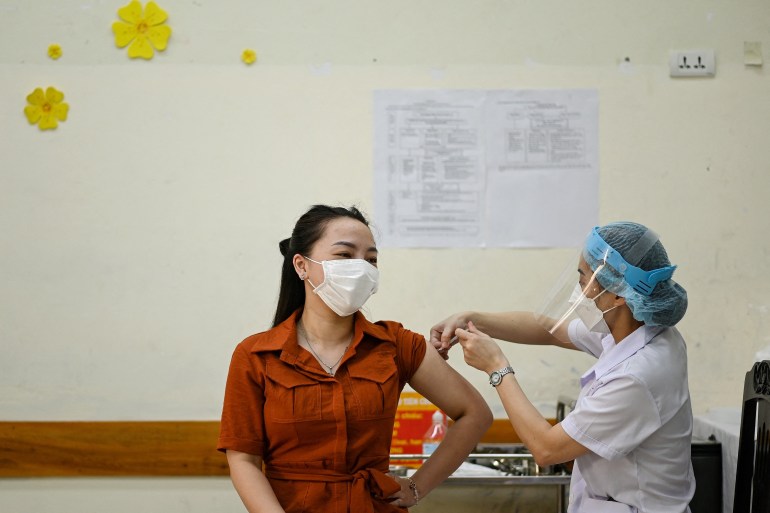
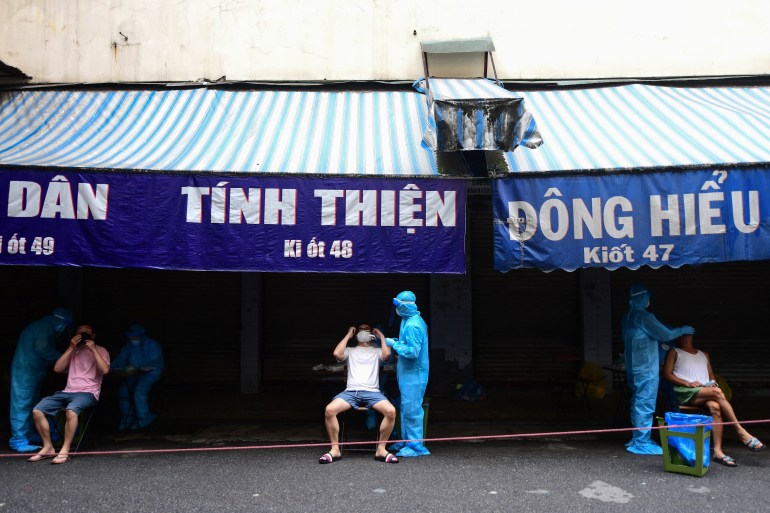
A recent survey from a local news source found that 62 percent of the 69,132 participants had lost their jobs because of COVID-19. Of the unemployed, roughly 40 percent of respondents reported that they had not received any support. For those who did get assistance, only 3.5 percent said it had come from the government.
“We’ve never seen this level of need for a quarter of a century,” Damien Roberts, executive director of Saigon Children’s Charity, told Al Jazeera. “We’re seeing a huge kind of demand for very basic support.”
While those in need struggle to get enough food, a 26-year-old American citizen in Phu Nhuan District said she has received two free food packages from the government since August 27, as well as 1.2 million Vietnamese dong, roughly $52.
When she received the second food package, she was asked to pose for a photo.
“I stood next to this guy in a green uniform, and the guy in the green uniform kind of held the underneath of the bag looking like he was handing it to me,” she said of the photo op. “I’m still employed … I felt like I was definitely the wrong population to be assisting.”
With restrictions set to continue for at least nine more days, analysts said the government must speed up the pace of vaccinations – only 3.3 million people out of a population of 96 million have received two doses – and step up support for the poor and the needy.
“I don’t really agree with the way the government addresses the problem from the top rather than addressing it from the root of the problem like having a fiscal package to support people, spending more to support poor people and spending more to buy vaccines,” said the Vietnamese political analyst who preferred not to be named.
“Implementing a bunch of army and police on the street … it is not sustainable,” she said. “Why do people have to go out on the street? It is because they don’t have jobs and they don’t have food.”